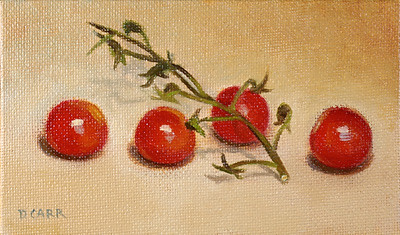I got to thinking again about simplifying my colors, so I scraped off a few "in-betweens" that had been hanging out at the top of my palette too long, and rethought the overall arrangement. Not the simplest palette, but I'm proud I can keep within a dozen colors (how can I say good-bye to burnt sienna and cad. red light?). Here's my still-evolving evolving palette as of this painting:

From left:
flake white hue (I started playing with it recently; W&N) and titanium white (*)cad. yellow medium (Gamblin)yellow ocher (Williamsburg)cad. red light (*)cad. red medium (Gamblin)alizarin crimson (*)transp. oxide red (Rembrandt)burnt sienna (Grumbacher)burnt umber (Williamsburg)cerulean blue (Gamblin)ultramarine blue (*)ivory black (W&N)
The greens are mixes, generally of yellow and ultramarine, so they begin life down in the main mixing area next to my mixed browns - which feels perfect to me, as in the natural world greens and browns are usually found together. I used to have a tube green up top, but found it unnecessary most times. The brown mess in the middle is my general coffee-mud made up of ocher, transp. oxide red and burnt umber, and lately has been the color I start laying out with.
The palette itself is a glass piece that I've had since school, and which has a manila folder on the backside right now. It used to have brown paper taped to the back to mix my colors against, but I realized it made little sense when I didn't always start my paintings with middle- to dark-value brownish grounds. In one of the tin cups is a 1:1:1 mix of stand oil, turpentine and damar, which has been pretty comfortable for me but I'd like to experiment more.
*Brands I'd rather not name. The other brands aren't all my preferred ones, but may have been influenced by what money I had.




No comments:
Post a Comment